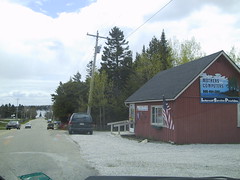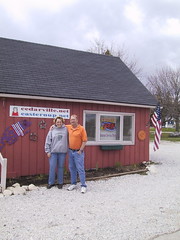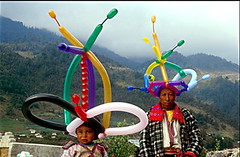Sunday, May 29, 2005
Friday, May 27, 2005
Wednesday, May 25, 2005
From eSchool News
In January 2003, eSchool News first reported on an initiative from the University of Maryland to create a massive collection of children's books from around the world that is freely available to children, teachers, librarians, parents, and scholars worldwide via the internet. Now, halfway into the five-year project, some 600-plus volumes comprise the International Children's Digital Library. Funded by the National Science Foundation and the Institute for Museum and Library Services, the site has five goals: to create a collection of more than 10,000 books in at least 100 languages; to develop a user-friendly interface that lets children search, browse, read, and share books in electronic form; to provide a deeper understanding of copyright and "fair use" in the digital era; to evaluate the impact that access to digital materials has on school and public libraries; and to explore the relationship between children's access to digital collections of multicultural materials and their attitudes toward books, reading, technology, and other countries and cultures. The materials included in the collection reflect similarities and differences in cultures, societies, interests, and lifestyles of peoples around the world. The project's creators hope that tolerance and acceptance can be achieved through a greater understanding of one another.
In January 2003, eSchool News first reported on an initiative from the University of Maryland to create a massive collection of children's books from around the world that is freely available to children, teachers, librarians, parents, and scholars worldwide via the internet. Now, halfway into the five-year project, some 600-plus volumes comprise the International Children's Digital Library. Funded by the National Science Foundation and the Institute for Museum and Library Services, the site has five goals: to create a collection of more than 10,000 books in at least 100 languages; to develop a user-friendly interface that lets children search, browse, read, and share books in electronic form; to provide a deeper understanding of copyright and "fair use" in the digital era; to evaluate the impact that access to digital materials has on school and public libraries; and to explore the relationship between children's access to digital collections of multicultural materials and their attitudes toward books, reading, technology, and other countries and cultures. The materials included in the collection reflect similarities and differences in cultures, societies, interests, and lifestyles of peoples around the world. The project's creators hope that tolerance and acceptance can be achieved through a greater understanding of one another.
David's Journal: March %u2013 May 2005
In the why I love the internet category: I have been enjoying reading D. Byrne's journal. First introduced to it when he was on tour - shortly after we had seen him in Milwaukee. Interesting to read his take on the various cities he played in. I've enjoyed his music and sensibiltiy for years. When we first moved to Milwaukee and didn't know anyone, the Oriental Theatre had a big suit contest. John spent the day building a big suit and that night won the look alike contest - dancing on stage in absolute joy. We didn't know a soul, had the time of our lives and we came home with every Talking Heads album that had been recorded to date!
Anyway his music is a soundtrack to our own history - and it is comforting to read someone whose thinking is like-minded to your own in some ways.
Anyway his music is a soundtrack to our own history - and it is comforting to read someone whose thinking is like-minded to your own in some ways.
Jon Udell: It's not about Old Media versus the Pajamahideen
Another thoughtful post by John Udell.
It's not about Old Media versus the Pajamahideen
When conversations turn to the rivalry between Old Media and the Pajamahideen, I try to steer another course. Blogging, rightly understood, isn't going to take down newspapers, magazines, and TV, it's going to energize them. The adversarial rhetoric mostly just gets in the way.
Still, there are times when Old Media begs for a resounding dope slap. Yesterday's splashy story in the Wall Street Journal, ambitiously titled How Old Media Can Survive in a New World, is one such invitation. "Here's a look at what's ailing various media industries," the report begins, "and what our experts suggest to cure their ills."
The two-page spread opens with an 8-inch-tall hunk of meaningless clip art. It divides itself into sections on TV news, TV entertainment, newspapers, advertising, books, movies, and music. For newspapers, here are the Journal's recommendations:
"Think more about news, less about paper." Among the brief list of suggestions, we're told that "some reporters should be allowed to craft blogs about their topic of expertise."
"Let readers customize their newspaper." In other words, portals will save the day: "For example, newspapers might allow their readers to click a few buttons and see all of a paper's coverage about local politics."
"Follow the reader around." If portals won't save us, then maybe alerts will: "Two or three times a day, I think I might be interested in catching up on sports events or some kind of breaking-news event that was of national stature."
Does that sound like a successful turnaround formula to you? Me neither.
From my perspective, blogs aren't optional extras that "some reporters" should be "allowed to craft." They're essential tools -- and not just for journalists, but for every professional person. Collectively we'll use the blog network to document, discover, and validate expertise.
Who, for example, is Brian Steinberg, the author of the above recommendations? The Journal asserts that he is one of "our experts." Google tells me he's a WSJ staff reporter. At ad-rag.com I learn that he's the Journal's "advertising reporter" and I dig up a reference to an audio appearance on theadvertisingshow.com. These sources suggest to me that Steinberg was probably the right guy for the future-of-advertising blurb (which he also contributed), but perhaps not for the future-of-newspapers blurb.
I'm not just throwing rocks at the WSJ, by the way. This kind of thing can happen at every publication -- including, mea culpa, InfoWorld. Happily, we're entering a world in which expertise isn't merely an assertion, it's a transparently discoverable reality. The skills and knowledge of reporters, writers, and editors, like the skills and knowledge of their sources -- the folks whose ideas and experiences inform publications -- can be and will be documented on the public web.
It's understandable that this radical accountability would terrify Old Media. Of course their stalkers, the Pajamahideen, are likewise accountable. And that's just the tip of the iceberg. Most professional lives will be open to inspection, most significant achievement will be well-documented, most reputations will be measurable.
If you're a lawyer or teacher or city planner or scientist, why would you invite such scrutiny? That's the wrong question to ask. Think about it like this instead. On your blog, you can document your public agenda better than anyone else can. If you've ever been interviewed by a newspaper reporter, you know the drill. An hour of careful explanation may be reduced to a quote that makes you cringe. What hasn't occurred to most people yet is that you can publish that careful explanation yourself. Or that, when you do, the web's aggregation engines will surface your words in appropriate contexts, and will help people measure their impact.
Where journalism intersects with public agendas, its sources of raw information and opinion will increasingly be visible. That's a feature, not a bug! Not everyone can gather, dig, sift, sort, analyze, and synthesize. Most people rely on journalists to do these things because most people have other jobs to do. In a more transparent world, journalists will be able to probe more deeply and synthesize more powerfully -- and we will be able to trust and verify their methods.
If you buy this argument, note that the burden of reform is not borne solely by Big Media. Yes, these institutions will need to engage with the blogosophere, but so will everyone who seeks to advance a public agenda. A while ago, Dave Winer nailed this. In a knowledge-based economy, narrating your work becomes part of everyone's job. That narration produces artifacts we call blogs. They'll transform Big Media, but only because they'll transform society.
It's not about Old Media versus the Pajamahideen
When conversations turn to the rivalry between Old Media and the Pajamahideen, I try to steer another course. Blogging, rightly understood, isn't going to take down newspapers, magazines, and TV, it's going to energize them. The adversarial rhetoric mostly just gets in the way.
Still, there are times when Old Media begs for a resounding dope slap. Yesterday's splashy story in the Wall Street Journal, ambitiously titled How Old Media Can Survive in a New World, is one such invitation. "Here's a look at what's ailing various media industries," the report begins, "and what our experts suggest to cure their ills."
The two-page spread opens with an 8-inch-tall hunk of meaningless clip art. It divides itself into sections on TV news, TV entertainment, newspapers, advertising, books, movies, and music. For newspapers, here are the Journal's recommendations:
"Think more about news, less about paper." Among the brief list of suggestions, we're told that "some reporters should be allowed to craft blogs about their topic of expertise."
"Let readers customize their newspaper." In other words, portals will save the day: "For example, newspapers might allow their readers to click a few buttons and see all of a paper's coverage about local politics."
"Follow the reader around." If portals won't save us, then maybe alerts will: "Two or three times a day, I think I might be interested in catching up on sports events or some kind of breaking-news event that was of national stature."
Does that sound like a successful turnaround formula to you? Me neither.
From my perspective, blogs aren't optional extras that "some reporters" should be "allowed to craft." They're essential tools -- and not just for journalists, but for every professional person. Collectively we'll use the blog network to document, discover, and validate expertise.
Who, for example, is Brian Steinberg, the author of the above recommendations? The Journal asserts that he is one of "our experts." Google tells me he's a WSJ staff reporter. At ad-rag.com I learn that he's the Journal's "advertising reporter" and I dig up a reference to an audio appearance on theadvertisingshow.com. These sources suggest to me that Steinberg was probably the right guy for the future-of-advertising blurb (which he also contributed), but perhaps not for the future-of-newspapers blurb.
I'm not just throwing rocks at the WSJ, by the way. This kind of thing can happen at every publication -- including, mea culpa, InfoWorld. Happily, we're entering a world in which expertise isn't merely an assertion, it's a transparently discoverable reality. The skills and knowledge of reporters, writers, and editors, like the skills and knowledge of their sources -- the folks whose ideas and experiences inform publications -- can be and will be documented on the public web.
It's understandable that this radical accountability would terrify Old Media. Of course their stalkers, the Pajamahideen, are likewise accountable. And that's just the tip of the iceberg. Most professional lives will be open to inspection, most significant achievement will be well-documented, most reputations will be measurable.
If you're a lawyer or teacher or city planner or scientist, why would you invite such scrutiny? That's the wrong question to ask. Think about it like this instead. On your blog, you can document your public agenda better than anyone else can. If you've ever been interviewed by a newspaper reporter, you know the drill. An hour of careful explanation may be reduced to a quote that makes you cringe. What hasn't occurred to most people yet is that you can publish that careful explanation yourself. Or that, when you do, the web's aggregation engines will surface your words in appropriate contexts, and will help people measure their impact.
Where journalism intersects with public agendas, its sources of raw information and opinion will increasingly be visible. That's a feature, not a bug! Not everyone can gather, dig, sift, sort, analyze, and synthesize. Most people rely on journalists to do these things because most people have other jobs to do. In a more transparent world, journalists will be able to probe more deeply and synthesize more powerfully -- and we will be able to trust and verify their methods.
If you buy this argument, note that the burden of reform is not borne solely by Big Media. Yes, these institutions will need to engage with the blogosophere, but so will everyone who seeks to advance a public agenda. A while ago, Dave Winer nailed this. In a knowledge-based economy, narrating your work becomes part of everyone's job. That narration produces artifacts we call blogs. They'll transform Big Media, but only because they'll transform society.
Cnytr
Interesting blog - published by an anonymous Dominican ... saw this and couldn't help but chuckle...
.:{A Psalm for finals}:.
The professor is my quizmaster, I shall not flunk.
He maketh me to enter the examination room;
He leadeth me to an alternative seat;
He restoreth my fears.
Yea, though I know not the answers to those questions, the class average comforts me.
I prepare my answers before me in the sight of my proctors.
I anoint my exam papers with figures.
My time runneth out.
Surely grades and examinations will follow all the days of my life,
And I will dwell in this class forever.
originally posted by Lauren
.:{A Psalm for finals}:.
The professor is my quizmaster, I shall not flunk.
He maketh me to enter the examination room;
He leadeth me to an alternative seat;
He restoreth my fears.
Yea, though I know not the answers to those questions, the class average comforts me.
I prepare my answers before me in the sight of my proctors.
I anoint my exam papers with figures.
My time runneth out.
Surely grades and examinations will follow all the days of my life,
And I will dwell in this class forever.
originally posted by Lauren
Wednesday, May 18, 2005
ANOTHER SPRING
The minute that graduation is over and the last diploma has been handed out, the last hug given, the last parent met - I head north. Opening the cabin and walking through the woods and along the Lake and creeks - we are a few weeks ahead in Milwaukee and it was 37 degrees here the other night - is like watching spring come all over again.
Fields of trillium and flocks of birds all singing brilliantly. Hummingbirds hit the feeder within five minutes of putting it up. Where do they come from? (More on this later...)
The folks at MOTHERS have set me up with dial up access, and it is humbling to realize how SPOILED we are - waiting for everything to load. But MOTHERS is a godsend and I tip my hat to them for being pioneers here. Still I run to the Les Cheneaux Library for wireless when I need to blog.
Fields of trillium and flocks of birds all singing brilliantly. Hummingbirds hit the feeder within five minutes of putting it up. Where do they come from? (More on this later...)
The folks at MOTHERS have set me up with dial up access, and it is humbling to realize how SPOILED we are - waiting for everything to load. But MOTHERS is a godsend and I tip my hat to them for being pioneers here. Still I run to the Les Cheneaux Library for wireless when I need to blog.
Thursday, May 12, 2005
BalloonHat.com - Write Us
BalloonHat.com - Write Us
Leslie
hello, this is addi, the balloon hat guy. thanks for checking out our site and writing us a letter. please feel free to use anything from the site for your blog. i checked it out just briefly now and it looks really cool. i will read it more when i have time tonight. we had a great time in milwaukee. one of the few places where are artist type can still buy a house and not be surrounded by idiots. we would love to come back. I live in LA and charlie the photographer is in NYC. Just to let you know, the balloon hat movie is done, it is 88 minutes. also I have a new 45 minute show I have been doing at school and libraries for kids around here. Just some ideas. thanks again for taking the time to write us a letter. caio for now
a
a
a
Is it possible for me to use one of your images on my blog to promote your web-site? Just heard about you today and yeah, I guess this is a kind of a love letter. What an exceptional project! I noticed that one of your images is of Bob in Milwaukee. When were you here? I will definitely work on a way to bring you back this way.
All best wishes.
Leslie
Leslie
hello, this is addi, the balloon hat guy. thanks for checking out our site and writing us a letter. please feel free to use anything from the site for your blog. i checked it out just briefly now and it looks really cool. i will read it more when i have time tonight. we had a great time in milwaukee. one of the few places where are artist type can still buy a house and not be surrounded by idiots. we would love to come back. I live in LA and charlie the photographer is in NYC. Just to let you know, the balloon hat movie is done, it is 88 minutes. also I have a new 45 minute show I have been doing at school and libraries for kids around here. Just some ideas. thanks again for taking the time to write us a letter. caio for now
a
a
a
Is it possible for me to use one of your images on my blog to promote your web-site? Just heard about you today and yeah, I guess this is a kind of a love letter. What an exceptional project! I noticed that one of your images is of Bob in Milwaukee. When were you here? I will definitely work on a way to bring you back this way.
All best wishes.
Leslie
BuzzMachine ... by Jeff Jarvis
Big Mac tax
: Detroit is talking about taxing fast food.
What a nitwit idea.
First, what's fast? My Chinese restaurant is really fast but it doesn't sell burgers.
Second, poor people eat fast food. Let's tax them more. Poor people serve fast food. Let's eliminate a few of their jobs.
Third, this is a rather obnoxious means of trying to legislate lifestyle. I'm OK with taxing tobacco because the cost to society of its effects is substantial. Booze? Well, what the hell, that precedent is set. Gasoline? Yes, we need to find some way to reduce demand (though this isn't the way... but that's another argument).
But taxing my Taco Bell chicken grilled stufft burrito? Butt out, bozo.
This is taxation as punishment for something somebody doesn't approve of: Tax the smokers, the drinkers, the gas-guzzlers, the rich, the burger-snarfers.
What's next? Taxing violent games? Sexy movies? Condoms?
If we're really going to improve the quality of life via fiscal policy, I say let's tax checkered flannel shirts, polyester suits, car alarms that make 20 obnoxious sounds and never turn off, Dr. Phil, mullets, Britney Spears CDs, bare-midriff tops over size 6, Speedos in any size, magnetic ribbons on the backs of cars in any color, Starbucks orders of more than four words, pop-up ads, tofu, PowerPoint, and gum.
What else?
: Detroit is talking about taxing fast food.
What a nitwit idea.
First, what's fast? My Chinese restaurant is really fast but it doesn't sell burgers.
Second, poor people eat fast food. Let's tax them more. Poor people serve fast food. Let's eliminate a few of their jobs.
Third, this is a rather obnoxious means of trying to legislate lifestyle. I'm OK with taxing tobacco because the cost to society of its effects is substantial. Booze? Well, what the hell, that precedent is set. Gasoline? Yes, we need to find some way to reduce demand (though this isn't the way... but that's another argument).
But taxing my Taco Bell chicken grilled stufft burrito? Butt out, bozo.
This is taxation as punishment for something somebody doesn't approve of: Tax the smokers, the drinkers, the gas-guzzlers, the rich, the burger-snarfers.
What's next? Taxing violent games? Sexy movies? Condoms?
If we're really going to improve the quality of life via fiscal policy, I say let's tax checkered flannel shirts, polyester suits, car alarms that make 20 obnoxious sounds and never turn off, Dr. Phil, mullets, Britney Spears CDs, bare-midriff tops over size 6, Speedos in any size, magnetic ribbons on the backs of cars in any color, Starbucks orders of more than four words, pop-up ads, tofu, PowerPoint, and gum.
What else?
Wednesday, May 11, 2005
Tuesday, May 10, 2005
Jon Udell: Simple Single Sign-on, courtesy of Nic Wolff
A great idea if you are continuously using the same log-in password - or wishing that you had the kind of brain that would allow you to memorize several.
Subscribe to:
Comments (Atom)







